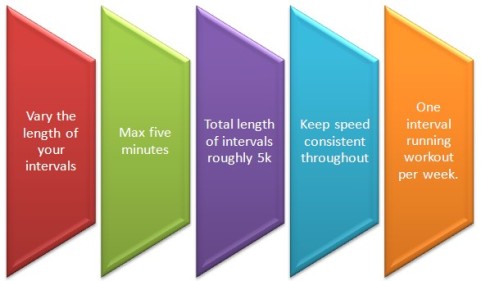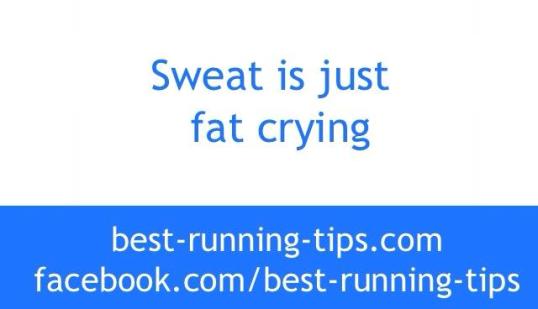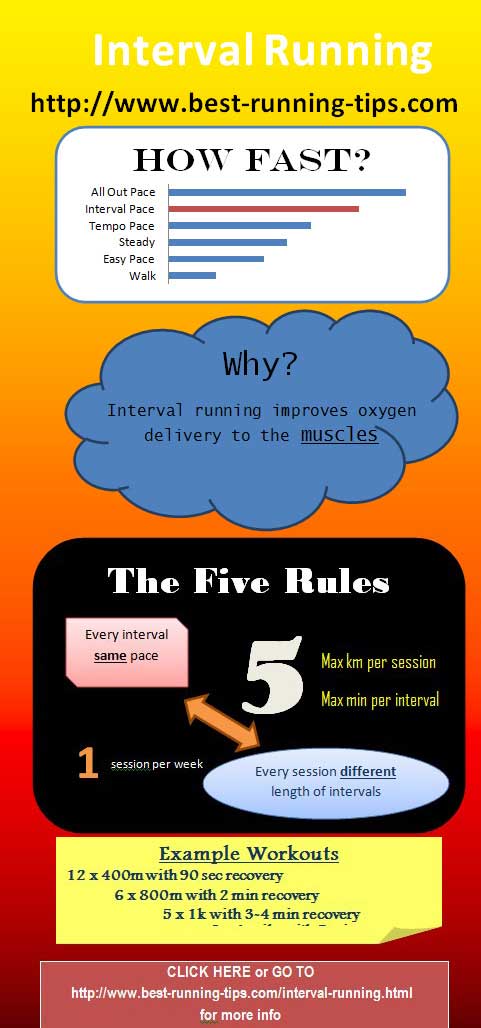Interval Running - The Workout You Love and Hate
Interval running can be challenging and taxing. When you do intervals, you generally run at higher speeds. That makes it hard, and at times, uncomfortable.

Before you start doing intervals, you should be able to run at easy pace first. I generally recommend that you first spend some time building your base, then do speedwork.
Without the ability to run long, the ability to run fast is useless. Any running race longer than 800m relies on endurance more than it relies on speed! So, build that base first.
After you have done that, you can start incorporating intervals. And even then, my advice is that you do intervals only once a week, max. That is plenty when you are involved in an endurance sport!
Interval running workouts are taxing, hard sessions. Too many of them in a week will make it too hard to put other tough workouts (long runs, lactate treshold runs) into your schedule. And hard workouts increase the risk of injury. So, don't overdo a good thing!
What do we cover on this page? Well in short:
Don't feel like reading? Then just watch this quick video which will explain it all to you:
What is Interval Pace?
Interval pace is faster than your lactate treshold pace. It is the pace at which you feel lactic acid building up in your legs. You will not be able to hold this pace for miles and miles without having to slow down.
It will leave you out-of-breath. It is important to understand that interval running is not quite an all-out-attempt. But it is not far off. As with other paces, your heart rate monitor can help you in establishing proper interval pace. See the heart rate monitor training section for more details. However, it is a bit harder to use the heart rate monitor for this purpose. Your heart rate always needs a bit of time to adjust when you start going faster (or slower). So, when you are doing very short intervals (e.g. 30 seconds or so), then you do not give your heart a lot of time to adjust.
So, your heart rate monitor is a good assistant, but through practice, learn to feel what interval pace is.
Why Do Intervals?

When you run fast, your heart needs to beat faster.
It needs to pump more blood (oxygen) to your running muscles.
Your muscles need to work on absorbing that oxygen as efficiently as possible.
So, this speed trains your body in getting better at oxygen processing.
That sounds great, but why is this good?
The more oxygen which is delivered to your muscles, the faster and the further you will be able to run. Your muscles need the oxygen to function. If they don't get enough of it, they will not work as well for you.
So, How Many Intervals Do You Do?

Maybe the first interval session you do, only consists of four to six 30-second intervals with a 30-second or one-minute jog in between. Of course, your total run would be longer than four to six minutes or so, you'd add a warming up and cool down to the mix!
But yes, start with not too many intervals and not too long ones. Take it from there and build up slowly.
Are you a starting runner (this is your first year)? Then do 30-second to 1-minute intervals with a 30-second to 1-minute recovery jog in between.
More experienced? Then you can do longer intervals. The longest being 5 minutes is the general belief. Of course, when you do longer intervals, your recovery jogs should be longer in between as well.
As a general rule of thumb: make sure the total distance spent running at interval speed in your workout is about 3 miles / 5k maximum.
So, for example, 12 x 400m intervals or 5 x 1k. Not 10 x 1k.
Why not? It's quite simple. When you want to do way more mileage, it will become increasingly difficult and even impossible to keep on doing the workout at interval speed. You'll simply get too tired and slow down.
It's really about the quality of the workout. Your interval workout doesn't get better from just more intervals. It gets better from doing the right number of intervals at the right speed.
So, don't do endless intervals thinking you are getting better. Your speed will suffer.
Interval Running Workouts I Do

Now, some of this is already mentioned above, but just reinforcing the message... the key rules I follow when doing my interval workouts are:


Warming Up and Cooling Down
Because it is faster than easy pace, a good warm-up and cool-down are needed for an interval workout.
So, make sure you check out the article on Most Important Running Stretches (click pic below). It contains good stretches and more information about warming ups and cooling downs.
And of course, for plenty more tips you really need to check out all the other information in the running training section.
After all, interval speed is only one of the running speeds available to you; for races 10k and up I'd also argue it's probably the least important speed! So, make sure you read the following pages as well:
Home > Running Training > Interval Running










